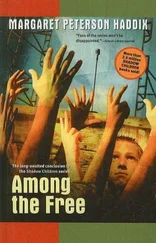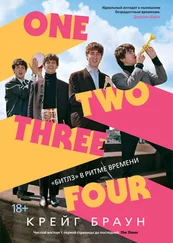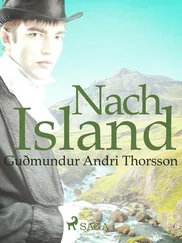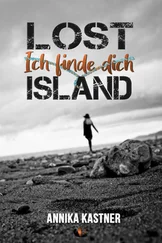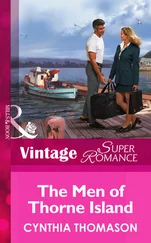As soon as she has put on the brakes at the gate and set one foot on the ground, she begins to look around for her classmates. They’re huddled between the bike stand and the outhouse. Sylvia, Barbro, Gunvor, and Majbritt.
And Vera. She’s at the center of the crowd. Apparently she’s doing one of her imitations. The others are watching her and laughing.
Stephie walks the bike over to the stand. No one notices. She glances furtively toward the group surrounding Vera.
Vera’s holding one of her arms as if it’s hurt. “Ow, ow!” she cries. “My arm! I think it’s broken!”
At that very moment, Gunvor catches sight of Stephie. “Here she comes!” she shouts.
Stephie feels a lump forming in her throat. At first it’s ice cold, then it feels hot. It grows larger and larger.
Everybody’s staring at her.
“Well, look at her,” Sylvia says in her most affected voice, like an adult talking to a child. “The old lady let the little girl borrow her bicycle. Be careful you don’t end up in the ditch. Next time there might not be anybody around to rescue you.”
Stephie forces herself to ignore them, looking straight ahead as she walks toward the bike stand. She has heard and seen enough: the mocking mouths, the scornful gazes. And Vera’s pale, embarrassed face, framed by her fluffy red hair.
On the stairs up to the classroom, Vera catches up with her. “Stephie,” she pants. “I apologize. I didn’t mean to-”
The lump in Stephie’s throat bursts. “Leave me alone!” she exclaims. “You’re just like all the rest. I despise you!”
In the fraction of a second before Vera turns away and continues on up the stairs, Stephie sees something in her eyes and recognizes it. She can’t pinpoint exactly what it is, but it makes her feel like bursting into tears.
After school Stephie delays leaving the hallway. She doesn’t want to arrive at the bike stand at the same time as all the others just to hear more taunting remarks.
When she finally leaves the building, she finds herself hoping to see Vera’s mane of red hair somewhere in the schoolyard, hoping Vera waited for her all the same.
But no one is there. Only six bikes remain in the stand. Aunt Märta’s looks very old-fashioned and awkward next to Sylvia’s blue one and Ingrid’s green one.
Stephie rolls the bicycle back out of the stand. Something doesn’t seem right. She feels the tires. They’re almost flat. The valve caps are off.
They must have done it at recess, since all the air has had time to leak out. It was probably Barbro. Or Gunvor. Or Majbritt. Or even Sylvia, though probably not. She’s always cautious about doing anything she might get caught and punished for. Sylvia gives the orders, the others obey.
Stephie searches the ground for the valve caps. She sees something gleaming. A little tack.
Pfff, says the air as it exits from Sylvia’s tire. Stephie presses the nail even farther in, until the head is visible only as a shiny little dot. It would be difficult to see it if you didn’t know it was there. It’s pressed all the way in, as if Sylvia had happened to bike over it on her way to school.
Stephie finds both valve caps, and luckily Aunt Märta keeps a bike pump attached to the frame. Stephie pumps up the tires and rides home.
The next morning they are at the bike stand, waiting for her. When Stephie parks her bike they close in around her. She’s their prisoner.
Sylvia is holding something between her thumb and forefinger, so close to Stephie’s face she can barely see it. A shiny object.
The tack.
“It was you,” Sylvia says. “Admit that you did it!”
Should she deny it? Sylvia would never be able to prove it.
“Confess!” Sylvia says. She’s so close, Stephie can feel the heat of her breath.
“Yes, I did it. But you let the air out of my tires first.”
“I did not,” Sylvia says. “And anyway, that’s different. You must apologize now.”
“Never.”
“Grab her,” Sylvia orders.
Barbro grasps Stephie’s right arm, twisting it up behind her back. It hurts.
“Did you say ‘never’?”
“That’s what I said.”
Barbro grabs Stephie’s hair, pulling her head backward.
“Is that what you said?”
“Right.”
Sylvia bends down and grabs a fistful of gravel from the ground.
“Remember when I washed your face with snow last winter? I’ll do it again. But with gravel this time.”
Stephie looks at Sylvia. She means business. Stephie’s only hope is for the bell to ring.
Sylvia takes another step toward her.
“Sorry,” Stephie says.
“On your knees.”
“No.”
“Otherwise it doesn’t count,” says Sylvia as Barbro presses Stephie to the ground. She falls to her knees in the gravel.
“Say it.”
“Sorry.”
“Say: ‘Forgive me for ruining your bike.’”
“Forgive me for ruining your bike.”
“And kiss my shoe.”
Sylvia extends her dusty sandal; it’s just a few inches from Stephie’s face.
“Kiss it!”
Barbro presses hard on Stephie’s neck. Stephie presses her lips tightly together before her face touches Sylvia’s shoe.
At last the bell rings.
The lawns in front of the little houses in the village are bright green. The low apple trees are covered with pink and white blossoms, and the lilac bushes with clusters of white and purple buds.
The house at the end of the world doesn’t have a yard with apple trees and lilac bushes. It’s too exposed to the wind off the water. But on the beach little flowers are pushing their way up between the rocks: yellow, white, and every possible shade of pink, from very, very pale to bright rose. In the crevices among the rocks there are patches of wild violets.
A mottled mother duck and her ducklings are on their way to the water. The ducklings are yellow-brown and fluffy. They follow their mother, swimming behind her in an orderly line.
“Come in for a fitting,” Aunt Märta calls from inside. She’s making Stephie a dress for the last day of school. The fabric is very pretty, white with little pink and blue flowers. Stephie would have liked buttons down the front, a collar and a chest panel. That would look more grown-up, but Aunt Märta says it’s too hard for her. So the front is just an ordinary straight bodice. There’s a little round collar, and a zipper in back.
“Ow!” Stephie complains when Aunt Märta accidentally pokes her in the shoulder while inserting a pin.
“If you’d just stand still, it wouldn’t happen,” Aunt Märta tells her. “Vanity is a sin.”
But she looks quite pleased with her handiwork, pulling a loose thread off the skirt.
The evening before the last day of school, Aunt Märta irons the new dress and starches a petticoat for underneath it. The fabric feels stiff, rustling when Stephie pulls it over her head.
Stephie is solemn. The dress is her first new piece of clothing since arriving on the island, except for underwear and stockings, which Aunt Märta buys by mail order, and the cap and mittens she gave Stephie for Christmas.
Mounting the bike, Stephie’s careful not to wrinkle her skirt. She spreads it out across the carrier, smoothing it with one hand, making sure the fabric won’t get caught in the spokes.
The classes gather at school and they walk in single file to the church. Almost all the girls have new dresses. Sylvia’s buttons down the front, as Stephie would have liked hers to. But no one has such a full skirt as Stephie.
The head teacher’s speech to all the children in the church seems endless. He talks forever about the “dark shadow of war across Europe,” encouraging the children to spend their summer not just having fun but also being extra-obedient because of “these terrible times.”
Читать дальше



